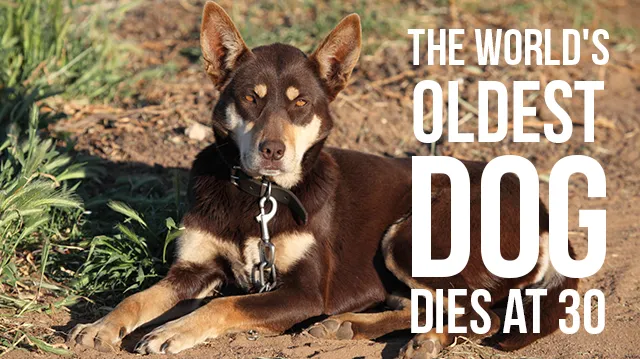Maggie lived on a dairy farm in Victoria, Australia. Her owner, Brian McLaren, is quoted in USA Today as saying she was still “walking from the dairy to the office and growling at the cats” as of last week, but went downhill over the past few days and died in her bed.
McLaren didn’t have Maggie’s original paperwork, so her age isn’t officially recognized. McLaren says he got her when his son, now 34, was a four-year-old boy. Maggie was laid to rest on the family farm under a pine tree.
The official title
Since Maggie’s actual birth date is uncertain, the official title of the world’s oldest dog at the time of death is still held by Bluey, who also resided Down Under. Bluey is listed in the Guinness Book Of World Records with a 1910 birth year. He died at age 29 in 1939. The Australian cattle dog spent his life herding cattle and sheep until the infirmities of old age forced his owner to have him euthanized in November 1939.
Australian kelpies
On average, Australian kelpies live between 10 and 13 years, which is also about average for dogs their size. They are a herding breed created by crossing collies and other herding types. It’s possible there’s some dingo blood in the mix. Dingos are Australia’s wild dogs, who likely originated in Southeast Asia.
Kelpies are very smart and love to work. They definitely need some kind of a job, and Maggie had one on the dairy farm: herding cows for many years until she slowed down to a supervisory capacity.
Long-lived breeds
As the saying goes, there’s only one thing wrong with dogs: They don’t live long enough. Losing a beloved pet is always tough, but odds are you’ll have more time with certain breeds. Generally, small dogs live longer than large ones. The longest living breeds include:
- Australian cattle dogs — Perhaps not surprising, as Bluey still holds the official record.
- Cardigan Welsh corgis — This is the corgi with a tail, who may live as long as 17 years.
- Chihuahua — These tiny canines often reach the age of 20 or more.
- Dachshunds — “Wiener dogs” are long-lived, and that’s especially true of the wirehaired variety.
- Havaneses — The cute, bright Havanese may reach 18 years.
- Pomeranians – These adorable, hairy little creatures usually live past age 15.
- Rat terriers — These small, feisty, fun-loving dogs often live to 17 or 18.
- Shih tzus — These happy little dogs live well into their teens.
- Toy poodles — Smart and sassy, toy poodles often reaches their twentieth birthday.
- Yorkshire terriers — These tiny but tough terriers may celebrate 20 years.
Short-lived breeds
On the other end of the spectrum are breeds with an unusually short life span. While the average dog is middle-aged at 10, many of these breeds never reach that age. Dogs with short life spans include:
- Bernese mountain dogs — Although they are great family dogs, this breed rarely lives beyond eight.
- French mastiffs — These dogs have among the shortest lifespans, some living only to five.
- Great Danes — The largest of all dogs, Danes generally live between six to eight years.
- Irish wolfhound — This giant breed usually doesn’t live beyond age seven.
Aiding longevity
Although genetics play a major role in life span, there are ways to keep your pet around as long as possible. Feed him a healthy diet free of by-products. Make sure your dog receives plenty of exercise. Take him to the vet for regular check-ups, and ensure he is on a good parasite-control program for fleas, ticks and heartworm. Train your dog — a dog that is well-trained and knows to come when called is less likely to get hit by a car or suffer another type of accident. Give him plenty of attention, love and affection. In the end, it’s the quality of his life that really counts.
—Jane Meggitt
Jane Meggitt graduated from New York University and worked as a staff writer for a major New Jersey newspaper chain. Her work on pets, equines and health have appeared in dozens of publications, including The Daily Puppy, The Nest Pets, Horse News, Hoof Beats and Horseback magazines.
Sources:
http://www.today.com/pets/dog-could-have-been-oldest-world-dies-30-t87536
http://www.usatoday.com/story/news/world/2016/04/20/worlds-oldest-dog-maggie-kelpie-dies-aged-30/83269528
http://www.vetstreet.com/dogs/australian-kelpie
http://www.vetstreet.com/dr-marty-becker/10-long-lived-dogs-this-veterinarian-sees
http://www.businessinsider.com/dog-breeds-that-live-the-longest-2014-9
http://www.newrattitude.org/adoptasenior.htm
http://www.caninejournal.com/life-expectancy-of-dogs

